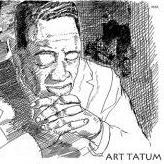Search the Community
Showing results for tags 'ricky riccardi'.
-
From 1929 to 1947 trumpeter and singer Louis Armstrong, who had already made a series of seminal small-group recordings that would become a cornerstone of jazz history, rose to popular culture stardom, appearing in movies, becoming the first African-American to host a weekly radio program, and waxing a wealth of material for Decca and other labels that brought him greater commercial success, as well as critical controversy. I’ll be featuring music from those years on this edition of Night Lights, and we’ll also hear from Armstrong biographer Ricky Riccardi, whose recent book Heart Full Of Rhythm chronicles this key but often overlooked stretch of Armstrong’s career: Swing That Music: Louis Armstrong In The Big Band Era
-
- louis armstrong
- ricky riccardi
-
(and 1 more)
Tagged with:
-
Published by Oxford University Press https://www.amazon.es/Heart-Full-Rhythm-Armstrong-English-ebook/dp/B08DYC3DT5/ref=sr_1_1?__mk_es_ES=%C3%85M%C3%85%C5%BD%C3%95%C3%91&dchild=1&keywords=riccardi+ricky&qid=1601967043&sr=8-1 https://global.oup.com/academic/product/heart-full-of-rhythm-9780190914110?cc=us&lang=en&# Description Nearly 50 years after his death, Louis Armstrong remains one of the 20th century's most iconic figures. Popular fans still appreciate his later hits such as "Hello, Dolly!" and "What a Wonderful World," while in the jazz community, he remains venerated for his groundbreaking innovations in the 1920s. The achievements of Armstrong's middle years, however, possess some of the trumpeter's most scintillating and career-defining stories. But the story of this crucial time has never been told in depth — until now. Between 1929 and 1947, Armstrong transformed himself from a little-known trumpeter in Chicago to an internationally renowned pop star, setting in motion the innovations of the Swing Era and Bebop. He had a similar effect on the art of American pop singing, waxing some of his most identifiable hits such as "Jeepers Creepers" and "When You're Smiling." However as author Ricky Riccardi shows, this transformative era wasn't without its problems, from racist performance reviews and being held up at gunpoint by gangsters to struggling with an overworked embouchure and getting arrested for marijuana possession. Utilizing a prodigious amount of new research, Riccardi traces Armstrong's mid-career fall from grace and dramatic resurgence. Featuring never-before-published photographs and stories culled from Armstrong's personal archives, Heart Full of Rhythm tells the story of how the man called "Pops" became the first "King of Pop." Table of Contents Prologue - Bigger Than Jazz 1. "There's a New King" - March 1929 2. "If Louis Did It, It Must Be Right - April-December 1929 3. "I Break It Up Everywhere I Play" - December 1929-May 1930 4. "He Would Just Amaze You" - June-November 1930 5. "Just One of the Cats" - November 1930-May 1931 6. "I Done Got Northern-fied" - May-August 1931 7. "They Admit You with a Smile" - September-November 1931 8. "An Artist of Eminence" - December 1931-June 1932 9. "The Real Test is Entertainment" - July-November 1932 10. "Always a Way, Man" - November 1932-June 1933 11. "What the Hell is Wrong with Louis Armstrong?" - July 1933-June 1935 12. "A Much Improved Salesman" - June-December 1935 13. "Swing Is My Bread and Butter" - January-December 1936 14. "A Boom to the Colored Race" - January-June 1937 15. "Just Glad to See Us" - July 1937-May 1938 16. "A Solid Man for Comedy" - May 1938-December 1939 17. "He is Like the Armstrong of the Old Days" - January 1940-July 1941 18. "I Never Tried to Be God" - July 1941-July 1942 19. "A Little Higher on the Horse" - August 1942-December 1943 20. "A Great Deal Less Than Grown Up" - January-December 1944 21. "Why Should I Go Back?" - January 1945-December 1945 22. "We Really Did Romp" - January 1946-February 1947 23. "Ain't No Music Out of Date as Long as You Play It Perfect" - 1947 Epilogue - I Can't Give You Anything But Love
_forumlogo.png.a607ef20a6e0c299ab2aa6443aa1f32e.png)

